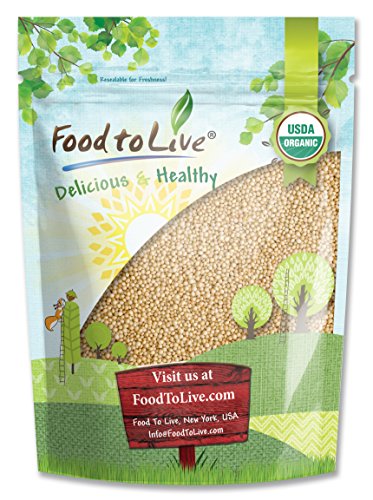- Features
- Description
- Similar Items
GLUTEN-FREE GRAIN: As it isn't really a grain and doesn't contain gluten, everyone can enjoy amaranth crackers.
SOURCE OF CALCIUM & IRON: Amaranth seeds provide you with more calcium, iron, and zinc than even quinoa.
RICH IN FIBER: You get 5g of dietary fiber from every cup of cooked Organic Amaranth from Food To Live.
100% TOXIN-FREE PRODUCT: Food To Live Organic Amaranth is certified organic and free from GMO.
Binding:
Misc.Brand:
Food to LiveEAN:
0650181889170Label:
Food to LiveManufacturer:
Food to LiveModel:
Size:
1 PoundWarranty:
What Is Amaranth?
Native to the exotic tropical lands of South America, the amaranth plant has become quite well known on the US food market in the recent years. It's definitely a great thing as this grain is very valuable nutrition-wise and offers a variety of benefits for any diet.
Food To Live Organic Amaranth is grown by environmentally-conscious farmers and processed at a top-notch organic certified facility. We make our products with love and care so that you and your family can enjoy adding them to a healthy diet.
Organic Amaranth is best bought in bulk as it keeps well and has a great many culinary uses that you can enjoy exploring.
Tumulus History of the Amaranth Grain
The cultivation of amaranth plants dates back for over eight millennia. These seeds were revered by the Ancient Aztecs and used in several of their religious practices. Considering its cultural significance as well as the numerous health benefits of amaranth, it can be surprising to see that this grain has fallen to obscurity and turned into a weed for quite a few centuries.
Spanish conquistadores were the reason of that. In their relentless fight with the native cultures of South America, they literally banned cultivation of amaranth plants because of their role in the spiritual practices of the Aztecs. However, even this couldn't destroy the precious plant completely and it has continued to grow as a weed.
The search for healthy foods conducted by contemporary scientists has brought amaranth seeds back into the spotlight in the 1970s. As this return is rather recent, it's quite understandable that this new grain is still fighting to win its place on the healthy foods market.
It's quite interesting to know that such a tragic history did have an unexpected benefit for the amaranth plant. Due to the lack of cultivation, its genetic makeup has remained almost unchanged.






